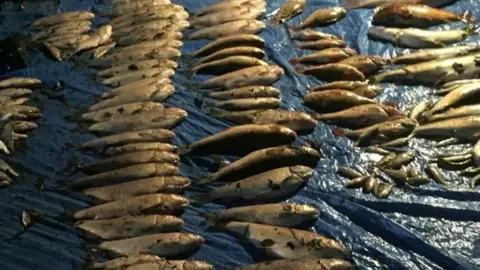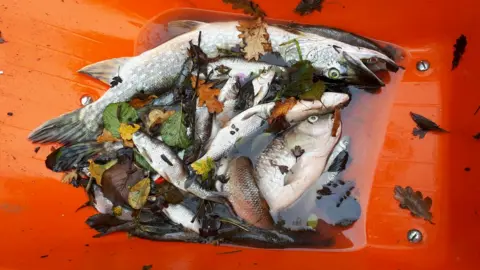Thames Water fined £3.3m over river sewage
 Environment Agency
Environment AgencyThames Water has been fined £3.3m after it discharged millions of litres of undiluted sewage into two rivers, killing more than 1,400 fish.
There was a "significant and lengthy" release of sewage from treatment works near Gatwick Airport in October 2017 into the Gatwick Stream in Sussex and River Mole in Surrey, a court heard.
Thames Water admitted four charges in an Environment Agency prosecution.
It was handed the fine during sentencing at Lewes Crown Court.
The company, which serves 15 million households, faces concerns over its future amid mounting debt.
Judge Christine Laing KC said she believed Thames Water had shown a "deliberate attempt" to mislead the Environment Agency, by omitting water readings and submitting a report to the regulator denying responsibility.
The court heard how a storm pump unexpectedly activated and was filling up the storm tank, despite no substantial rainfall, for 21 hours, which went unnoticed.
The pump then spilled sewage into the river for an estimated six hours but no alarm was in place to alert staff to the overspill, the court was told.
When an alarm was heard, the lead technician was uncontactable because they were awaiting a new mobile phone, the court was told.
 Environment Agency
Environment AgencyThe judge said she found it "utterly extraordinary" that environmental disasters could occur because of issues such as this.
She said the company "should have put in every effort into tidying up the problem areas".
Thames Water has had 20 previous fines for pollution spillage.
Last week, the company's chief executive, Sarah Bentley, stepped down after two years in the role, weeks after giving up her bonus over sewage spills.
Outside court, Jamie Lloyd, Environment Agency senior officer, told the BBC: "Firstly, when the alarm at the sewage works went off, they didn't inform the Environment Agency. They told us actually several times that nothing had happened at the sewage works.
"When they did accept responsibility, they then submitted a formal challenge asking us to remove the incident from our records, so, yes, they seemed to try and mislead the investigations that we were undertaking."
The Environment Agency said the firm allowed untreated sewage to pour into rivers outside storm conditions, which was illegal.
It said a stretch of river measuring nearly 5km, containing protected species such as European eel and brown trout, was in grave danger.
The agency said the storm lagoon was three-quarters of its legally-required size, meaning it filled with sewage earlier, discharged into rivers sooner, and gave less protection to fish.
Mitigation measures were available but missed and logbooks showed staff rated equipment as "unsatisfactory", before and after the incident, the agency said.
After sentencing, Richard Ayland, sustainability director for Thames Water, said: "This incident happened six years ago. That was then, this is now.
"We've had a new chief executive who came in and has spent three years devising a turnaround plan which is setting us on the road to a much more secure future for the company and the environment."
A spokesman for the Department for Environment said the fine would be paid into a treasury fund, but in the future water company environmental fines and penalties would be reinvested into the government's water restoration fund.
The record fine against a water company for illegal discharge of sewage is held by Southern Water at £90m.
That fine followed nearly 7,000 incidents across Hampshire, Kent and Sussex in a case brought by the Environment Agency in 2021.

Follow BBC South East on Facebook, on Twitter, and on Instagram. Send your story ideas to [email protected].
